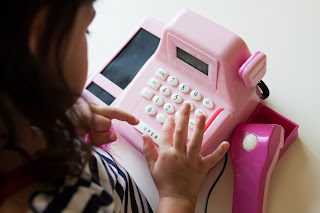The inspiration for this weeks article came from a discussion with my best friend who has a 5 year old girl and a conversation with my husband.
Attend to your child’s needs. I can’t tell you how many times I have seen kids crying in shopping carts and mothers just yelling at them, making them sit still etc. Attend to your child’s needs first. It is not their first choice to go shopping with you, especially when the child is young. Leave them with someone or plan your day around their happy period when there are well rested, fed and have no obvious needs. Cut it short.
You can validate them by saying things like, “I know it’s that fun for you to be here with me but we are almost done.”
Set an example. Don’t buy things because it’s a good deal. Sometimes you can’t help it because it’s hard to resist but remember your own example speaks louder than your words.
You have to say things you believe in. Never make up lies just because you don’t want to buy a particular toy. It’s best to be honest and remember, kids forget easily once these things are out of sight. Once I heard a mother threatening her toddler with it’s-made-of-cancer-causing-material. This is a big no-no.
Consider their requests seriously. Don’t just say “no” for the sake of saying “no”. Sometimes they do make great suggestions. I scored great shoes for my kid because she saw that they were $5.
Make practice trips to stores and buy nothing. Use the motto; We don’t always buy what we see.
Play Store-store at home. This is one of my child's favorite games. You can alternate being a customer and a cashier. I have mentioned many times that role plays are very powerful and educational. Get a play money set, a cash register maybe a shopping cart and you are good to go. This is also a good way of teaching them math skills.
Observe safety rules. Never let your child roam freely. Have them seated in the shopping cart.
You can take them grocery shopping by bringing their little toy shopping carts. You can teach about healthy choices. Make your child write the grocery list. Engage them by bringing their attention to things such as which apples you want this week, red or green? Enrich their vocabulary. Name every fruit or vegetable correctly and even attach some adjectives; “These peaches smell fantastically and they look so fresh and delightful.”
Don’t ignore your child. If your child throws a fit, don’t ignore her, pick her up, and calm her down. Take her to the restroom and wash her face. Make sure you don’t say hurtful things and show her that you are on her side. It could be embarrassing for a parent but remember that you are not the only parent ever visiting the store with a difficult child. Don’t disciple your child just to show a bunch of strangers that you are in charge. Seriously, nobody cares. You can also bring some toys or snacks for your child to be busy.
Never use shopping as a reward; "If you do this, then I will get you that."
It's manipulative. It teaches a wrong lesson. We don’t want kids to get the wrong notion that when we buy things for them equals we love them.
Surprise your child sometimes by getting things for her she loves but she didn't ask for. This one is really powerful.
Go to a store where there is no kids section. Browse with your child and admire things. Express your opinion about things and mention that there are so many things you adore but you can’t buy everything you like.
Teach your child about deals, clearance.
Before going to a store go over a few major rules, state the purpose of your visit, how much money you dedicate to that day’s shopping etc. Be simple, clear and state your expectations.
Never give them money with intention to-buy-what-they-want. Children do not work. They don’t earn money. They are not adults and they can’t spend money. You should always maintain the role of a parent but giving your child some choices. My daughter once said, “How come I never make decisions in the supermarket? I want to make some decisions today.” I asked her what choices did she want to make that day and she suggested getting fresh flowers. I gave her the power to choose even though the trip lasted more than expected but it was fun watching her smell and make a selection. She finally chose yellow and pink tulips.
Shopping, just like any other skill, gets better with practice.
Teach them to read simple labels, like the age requirement on the toys and the price. Use this opportunity to teach some math. Sometimes my daughter will notice some toy at the store and ask me to buy it but then I point to the age requirement and say that it's for older kids. She puts it back.
Splurge sometimes. Get what they really want. Don't put on their wish list or wait till Christmas time. 

No comments: